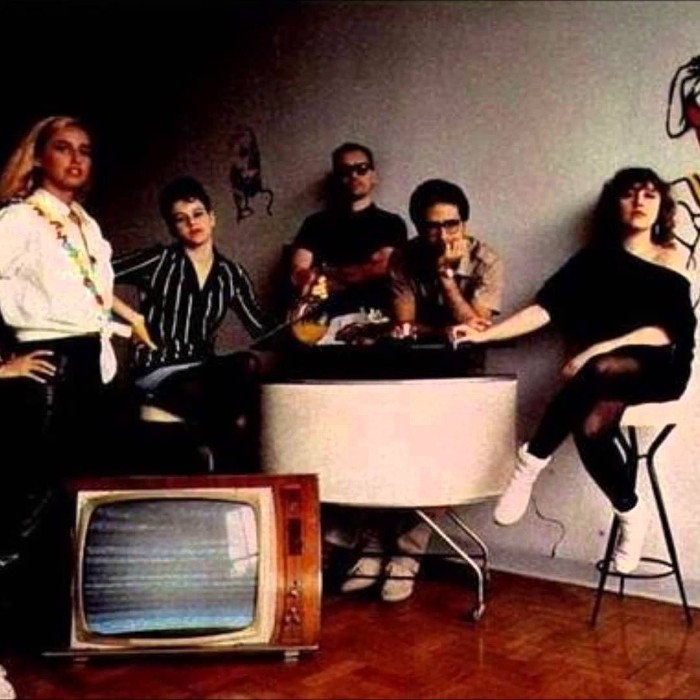Members
1 Mixed
Origin
 ---
---
Genre
---
Style
---
Mood
---
Born
1 Mixed
Origin
Genre
---
Style
---
Mood
---
Born
1981
Active 1981 to
![]() 1987
1987
Cutout![]()
4 users
4 users
4 users
4 users
Artist Biography
Available in:
'Yesterday night I dreamed I was Jack Keroac' The story of São Paulo's underground dates back from the early 80's and owes a lot to pop militant, poet, lead singer, DJ and full-time dreamer Julio Barroso and his Gang 90 & As Absurdettes. Julio was a larger than life character, a die-hard fan of black music who was also a 'living bible' of Brazilian popular music and a great admirer of acts such as Kid Creolle & The Coconuts, B52's and Pere Ubu. After living for some time in New York, by the late 70's where he worked as a barman, Julio used to check out the No Wave scene via Arto Lindsay. Back to São Paulo in the early 80's with a bag full of brand new records for the opening of Paulicéia Desvairada, São Paulo's first new wave club run by pop journalist Nelson Mota and entrepreneur Ricardo Amaral, he formed Gang 90. The band made its debut at the club and some time later in 1981, they recorded Perdidos Na Selva (Lost in The Jungle), a 7 inch single for Nelson Mota's label Hot. Perdidos Na Selva was written in collaboration with pop maverick Guilherme Arantes and amazingly it became a hit around Brazil due to Gang 90's participation at MPB Shell Festival and their unexpected nomination to be amongst the finalists of the contest. Gang 90 e As Absurdettes were made up of Julio Barroso on vocals, his loyal local divas May East, Alice Pink Pank, Lolita Renaux and Luiza Maria on backing vocals, including young musicians such as Gigante Brasil on drums, Lee Marcutti (formerly of Tutti Frutti) on bass, Wander Taffo on guitars and Guilherme Arantes on keyboards. Their B-side brought a funny version of 'Christine' of British outfit Siouxsie and The Banshees named Liliki Lamê. Gang 90 had dozens of different line-ups and would bring together a number of local musicians and pre-scenesters during their period of activity. Moreover the band was an extremely fashion-conscious outfit and served as a platform for Julio's advocacy of the concept of Antropophagy (our idea of cultural cannibalism as a positive force for transformation in the arts, in other words, our way of 'eating' from other cultures to produce new work). His moves were felt strongly in the scene and like the Tropicalists in the late 60's, Gang 90 were ready to devour new information wherever it came from. However, there was something about São Paulo's acts that made their music sound unexpected to the rest of the country. Sonically speaking, São Paulo's groups used to be much more urban, darker and spookier than their laid back peers from Rio de Janeiro -Cariocas. On the other hand, the Cariocas were already doing the 'beach new wave' sound of Rio, which back in the early 80's, dominated the whole country. Every Brazilian teenager would know by heart every single tune from Rio's outfits such as Blitz, Kid Abelha e Os Abóboras Selvagens, Barão Vermelho, Sempre Livre, Neuzinha Brizola amongst many others. Not to mention that Rio's bands were all signed to major record labels and had their first albums released with a good distribution around the country. São Paulo's acts formed the independent side of this industry. Fortunately, Gang 90 e as Absurdettes ended up getting signed to a major record label too. By 1983, they had a delicious tropical new wave hit around Brazil named Louco Amor (Crazy love), thanks to its insertion on the opening of an 8 o'clock soap opera which shared the same title of the Gang's track. This meant being played every day for about one year to millions & millions of Brazilians through TV Globo, the epitome of the country's mainstream. But the truth was that Julio wanted both sides of the cake. He wanted his cult status intact at the same time he wanted Gang 90 to achieve his ultra popular aspirations. In 1983, Gang 90 & As Absurdettes released their first LP Essa Tal de Gang 90 to great critical success but they didn't sell a lot like their counterpart new wave outfit Blitz from Rio. Sadly, in 1984 Julio was found dead in front of his building. He fell down from the 8th floor from his apartment flat in Santa Cecilia in the centre of São Paulo. From then on, his influence would echo around São Paulo's second and third waves of post-punkers.
Wide Thumb
Clearart
Fanart
Banner
User Comments
 No comments yet..
No comments yet..
